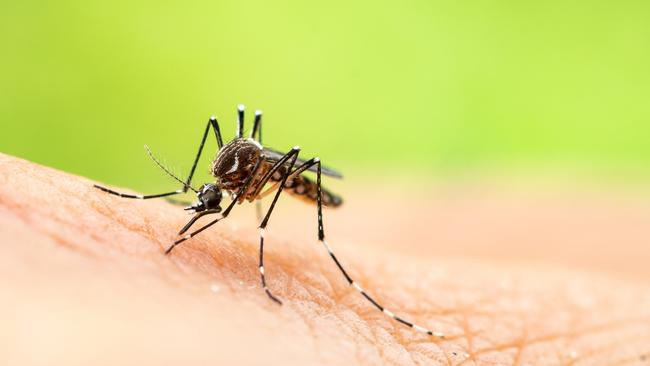Mozzie virus: Four cases of Japanese encephalitis detected in SA
The state’s first cases of Japanese encephalitis have been confirmed, sparking warnings to protect yourself. Here’s how to do it.
SA News
Don't miss out on the headlines from SA News. Followed categories will be added to My News.
The virus has been in Australia’s north for decades but has never been recorded this far south before. Experts believe the country’s wet weather has helped the spread.
With cases now recorded in NSW, Queensland, Victoria and SA, and with at least two deaths so far, Australians are being reminded of the best ways to protect themselves and their children.
EXPLAINER: WHAT IS THE DEADLY MOSQUITO VIRUS?
WHAT IS THE VIRUS
Japanese encephalitis (JE) is a disease caused by the Japanese encephalitis virus (JEV). It is spread to humans by infected mosquitoes, which become infected from biting infected animals.
It cannot be spread from human to human or contracted by eating animal products like pork or chicken.
WHAT ARE THE SYMPTOMS?
Less than one per cent of people infected with JEV will experience symptoms. Those that do will usually develop the following 5-15 days after being infected:
– Headache
– Fever
– Neck stiffness
– Disorientation
– Tremors
– Coma
– Seizures
IS IT DEADLY?
It is rare for people infected to become critically ill, with most people not displaying symptoms.
Severe symptoms can, however, lead to permanent neurological complications or possibly death.
Children younger than five and the elderly are the most at risk of serious disease.
WHO IS AT RISK OF INFECTION?
People working with pigs are known to be at higher risk of contracting the disease, with the disease linked to 21 piggeries across Australia.
Those who engage in outdoor activities like camping, fishing or hiking near significant mosquito populations, particularly near waterways, are also at risk.
WHERE HAS IT BEEN DETECTED?
Two cases have been confirmed in the Griffith region.
Several more people in NSW are currently undergoing further testing for JE and more cases are expected to be confirmed.
HOW TO PREVENT INFECTION
The best way to prevent infection is to take precautions against getting bitten by mosquitoes.
– Avoid going outdoors at dawn and dusk, and close to wetland and bushland areas.
– Wear long sleeves and pants outdoors
– Use repellent and reapply after swimming
– If camping, ensure the tent has fly screens to prevent mosquitoes entering.
– Mosquito coils and other devices that release insecticides can also be useful.
IS THERE A VACCINE
There is a vaccine to prevent the disease, with the federal government confirming there is enough to supply high-risk groups.
Victoria on Wednesday announced they would vaccinate high-risk communities, such as those who work with pigs, along the border against the virus.
WHAT IS THE TREATMENT
There is no specific treatment available for JE.

Four SA cases aged over 50
South Australia has recorded its first cases of Japanese encephalitis, sparking a warning for people to protect themselves from mosquito bites.
A recent investigation of 10 people with acute encephalitis identified in the past month found four cases were confirmed as Japanese encephalitis.
All four were people aged over 50, with two remain in hospital.
Department for Health and Wellbeing’s health protection and licensing services executive director Dr Chris Lease said three people had acquired the infection locally.
“All 10 people under investigation required hospitalisation, with seven people currently still in hospital and one person sadly passing away,” Dr Lease said.
“It is now more important than ever that we all take extra precautions against mosquitoes and continue to ‘fight the bite’.”
Most people who are infected with flaviviruses are asymptomatic or develop a mild febrile illness.
Around one per cent of infected people will develop encephalitis, which may be fatal or cause long-term neurological damage. Symptoms of encephalitis may include confusion, headaches, neck stiffness, tremors, drowsiness and seizures.
“Their outlook is pretty grim because effectively, that’s the brain involvement and that’s the encephalitis starting,” Dr Lease said.
“If people start to manifest some of those symptoms seek medical advice as soon as you possibly can.”
Effective vaccine in “short supply”
There is an effective vaccine available that Dr Lease said authorities are trying to roll out to people most at risk.
“The vaccine is in relatively short supply, as you might imagine. Across Australia, there’s a very high demand,” he said.
He said household protective measures remain the first line of defence for avoiding mosquito bites.
“If you are outside, apply an insect repellent containing DEET or picaridin, and try to stop mosquitoes coming indoors,” he said.
Dr Lease would not speculate on areas of the state where people might be more at risk.
“It’s wherever there are mosquitoes, it’s something you can’t be complacent about,” he said.
“We’re really trying to emphasise to people, it’s not just a case of ‘if I’m not in that area, I don’t have to worry about it’, it’s still possible.”
The mosquito-borne disease has also been detected in a commercial South Australian piggery.
PIRSA chief veterinary officer Dr Mary Carr said that the disease can cause reproductive failure in pigs.
“There is no treatment available for livestock which have JE, and I emphasise that mosquito management and prevention of mosquito bites is key to preventing the spread of this disease,” she said.
Horses are also susceptible to the disease, but there are no confirmed cases in the animal in Australia.
“We encourage horse owners to eliminate mosquito breeding grounds near their horses, such as stagnant water, to reduce the chances of them being bitten,” Dr Carr said.
A man aged in his 60s from northern Victoria was first recorded death from Japanese encephalitis announced on Tuesday.
On Wednesday, New South Wales health authorities confirmed a man aged in his 70s died with the virus on February 13.
More Coverage
Originally published as Mozzie virus: Four cases of Japanese encephalitis detected in SA




